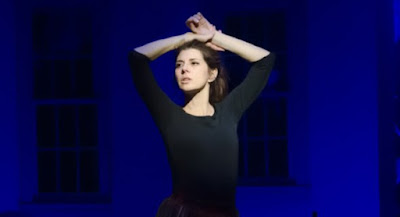How to Transcend a Happy Marriage
Written by Sarah Ruhl; directed by Rebecca
Taichman
Performances through May 7, 2017
Mitzi E. Newhouse
Theatre, 150 West 65th Street, New York, NY
lct.org
 |
| Marisa Tomei in How to Transcend a Happy Marriage (photo: Kyle Froman) |
Marisa Tomei has
come a long way. Sure, she won the 1992 Best Supporting Actress Oscar for My Cousin Vinny, but her next few movie
(and Shakespeare in the Park) appearances made her seem a one-trick pony
regurgitating variations on Mona Lisa Vito to diminishing returns. However, she
persevered and has turned into one of our best actresses, both onscreen (Oscar
nominations for In the Bedroom and The Wrestler) and onstage, where she is
giving a delectable and ultimately moving performance in Sarah Ruhl’s new tease
of a play, How to Transcend a Happy Marriage.
With their opaque
plots, absurdist situations and flowery language, Ruhl’s plays hint at
significance but—with the glorious exception of her lone Broadway outing, the
focused and superb In the Next Room, or the
Vibrator Play—always come up short. At least Marriage begins tantalizingly, with a tart exploration of how two
happily married, middle-aged couples from New Jersey perceive sexuality and its
taboos after falling under the spell of Pip, a polyamorous woman who is
blissfully living with (and loving) two men.
Tomei plays
George, our narrator and spirit guide, who is most transformed by Pip’s
appearance at a New Year’s Eve party; she becomes obsessed with Pip to the
point that she even misremembers what happened at the orgy that ended their debaucherous
evening. One day, George—short for Georgia, her nickname a sly Ruhl move that
further confuses the issues of sexuality and identity—goes bow hunting with Pip
to shoot deer (Pip kills and eats her own food, apparently another symptom of
polyamory), only to shoot a dog by mistake and end up in jail.
As a character, George
may not have true inner logic—another unfortunate Ruhl staple—but, like Mary
Louise Parker and Laura Benanti before her as Ruhl heroines, Tomei delivers a sparkling display
of comic energy and touching vulnerability, even putting across George’s clunky
closing monologue—which heavy-handedly equates the joys of polyamory with music-making—so
charmingly and committedly that it nearly sounds meaningful.
But Ruhl falters,
as she often does, by confusing absurdism with absurdity. The first act has intelligent,
amusing dialogue among the incredulous foursome and Pip and her men. But after
the orgy, Ruhl spins her wheels until simply letting the play trail off without
a dramatically or psychologically coherent resolution. That a real bird
suddenly shows up late in the play is a clear sign of desperation: by
concentrating on its sudden appearance, the audience might not notice that leaden dramaturgy
has taken over.
Rebecca Taichman’s
skillful production corrals an expert cast to play these people as individuals,
not freaks or parodies: Lena Hall is perfectly cast as the blue-haired, tattooed
and universally alluring Pip, while Robin Wiegert has a lovely and understated
presence as George’s close friend Jane. Credit also goes to David Zinn’s stylish
set, Susan Hilferty’s spot-on costumes and Peter Kaczorowski’s astute lighting.
But head and shoulders above all is Marisa Tomei’s George, guiding us in for a relatively
safe landing after an exceedingly bumpy ride.
No comments:
Post a Comment